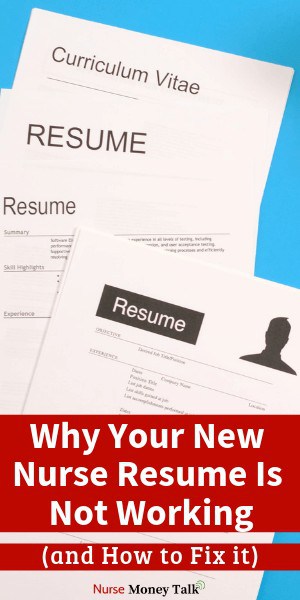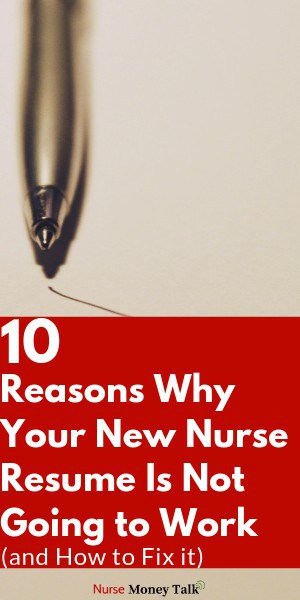If you’re reading about a new grad nurse resume, then you’ve graduated from nursing school.
Either that or you’re pretty darn close to it.
You’ve been a nursing student for far too long. Now it’s time to get a “big nurse” job.
You’ve sent in your new graduate resume to a couple of different hospital departments and crickets.
You don’t get a callback, let alone a rejection letter. Now what?
You’re probably wondering what you’re doing wrong.
There are several things you could be doing wrong.
To help you out we’re going to give you 10 reasons why your new nurse grad resume isn’t working.
We’re not just going to leave it there.
We’re going to provide you with some quick fixes to bring your new nurse resume up to par.
*disclosure: some of these links maybe affiliate links.
Common New Grad Nurse Resume Mistakes
1. Not Being Aware of Applicant Tracking Systems (ATS)
Talking about ATS might get a little technical, but bear with me.
Understanding what an ATS is and how it works is crucial when writing a new RN resume or new LPN resume.
I’ll try to simplify it as much as possible.
For starters, ATS is a recruiting and hiring software that many companies use (source).
Because applying for a job nowadays is so much easier than it ever has been companies need a way to sift through all those applications.
Many applicants apply for jobs they don’t qualify for just because they can.
Can you imagine a nurse recruiter or a nurse manager having to look through all those nursing applications just to throw out a good percent of them for
- Being poorly done.
- Not following directions.
- Not having enough experience.
- Not having the minimum level requirements for the job.
- And my favorite applying for the wrong job.
ATS helps streamline a lot of that by looking through applications and resumes and picking out the ideal applicant for the employer.
You’re probably wondering…
“Why you should care about this?”
What does knowing the backend of the hiring process have to do with you applying for your dream new nurse position.
EVERYTHING!
If you don’t understand how an ATS works, you might not even make it out of the pile to be viewed by a person.
There are three things to keep in mind…
Let’s start with the first and one of the most important.
One of the ways an ATS works is that it will look through resumes and pick out applicants based on keywords that the company is looking for.
So for example, let’s say the department is looking for a house supervisor.
Not just anyone but someone with a house supervisor experience.
They could set the ATS to seek out candidates with that experience.
So candidates without that keyword “house supervisor” in their resume would not make the cut.
The second thing to keep in mind is even with modern ATS they’re not very bright.
What I mean by that is overly complex resumes can confuse the system.
For example pictures and graphics.
That’s why it’s best to stick to a simple format for your resume.
The last thing I’ll mention before moving on is at this point you might be thinking
“well I’ll just stuff the resume with a bunch of keywords.”
Keep in mind that even if you do trick the system and move ahead, it will be looked at by a person eventually.
If it’s not easy to read it’s going to be rejected anyway.
How to fix this?
Keep reading.
Point #2 and beyond address the different sides of the ATS.
2. Sending a Resume with Spelling and Grammatical Errors

Sending a resume full of spelling and grammatical errors is not good. It shows two things.
The first is that you didn’t care enough about the job to take the time to fix those errors.
Secondly for a field like nursing attention to detail is important. Mistakes like that show you might not pay attention to detail.
A resume is usually the first impression the hiring manager has about you. You need to make it count.
How to fix this?
Take the time to proofread your nursing resume before turning it in.
Don’t forget to use the spell checker and have someone else read it. If you don’t have someone else read it.
Then try to reread it 24 hours later.
Occasionally you will write out an error and your brain will automatically fix it in your head, because you know what you meant to say.
This works fine since you wrote it.
Not so much for the nurse recruiter who’s reading it for the first time.
3. No Contact Information on the Nurse Resume
This is another one that detail is essential. Ask yourself why do you have a resume.
You have a resume so you can showcase your experience and talent. If the employer likes you what do you want them to be able to do?
You want them to be able to contact you.
If your information is not there or accurate, you make it hard for them to reach you. Many nurse hiring managers will just move on to the next candidate.
How to fix this?
Make sure to have your name, phone number and email address at the top of the first page of your resume.

Have it big and centered.
You want it big, so they can’t miss it.
You want it centered so if it’s printed out regardless of which side the paper is stapled your name and contact won’t be affected.
4. Using an Unprofessional Email Address

While we’re on the subject of contact.
Let’s run through a scenario.
The nurse recruiter has looked through your resume, and they’re starting to think to themselves “this new nurse grad is looking really legit.
I think I’m going to reach out and bring them in for an interview.”
They check to see what your email is and they see [email protected] or [email protected].
You don’t want to miss an interview opportunity just because the nurse recruiter can’t get passed your email address.
How to fix this?
Leave “big hottie” in high school where they belong.
Stick with something formal.
For example first initial and last name for a professional-looking email.
You can keep the high school email for your junk email address.
5. Too Many Pages in your Resume
As a new nurse grad, your resume should not be longer than one page.
It just shouldn’t.
I know you want to talk about all the wonderful clubs and activities you’re involved in.
As nice as that is, most of it is not relevant for your job.
Too many pages could very easily cause your recruiter to move on to the next candidate.
How to fix this?
For your new grad nurse resume stick to what’s relevant.
Unless you have years of prior experience that would be relevant for the job you’re applying for it’s best to condense it.
6. Having a One Size Fits all Resume
This is an easy mistake, and I understand why many new grad nurses make this mistake.
A lot of experienced nurses also make this mistake.
Even if you’re applying to the same role for different hospitals each job is still different.
There could be requirements for one ICU new grad nursing position that’s slightly different from the new grad ICU position of the hospital next door.
Not paying attention to that can make your resume look too generic and not stand out.
How to fix it?
Pay attention to the requirements listed for each position you’re applying too.
Tailor your basic resume to fit each position.
The applicant tracking system (ATS) are going to be looking for key terms.
For example, if you’re applying to the intensive care unit (ICU) and you have experience as an ICU nurse extern mention that.
Tailoring your resume to each position could be the difference between it moving past the applicant tracking system or not.
7. Keyword Stuffing your Resume
I mentioned this briefly earlier, but this requires reiterating. Plus many of you might not understand what I mean.
So when you keyword stuff, you’re unnaturally using “buzzwords.” In other words, it’s painfully obvious they’re just there for the ATS.
How to fix this?
Instead, make sure your keywords flow naturally within your resume.
You want to find a balance between writing for the machine and also writing for a human.
8. Not Having a Professional Summary
Having an objective used to be the standard.
Many nurse recruiters have moved away from that.
The reason is two folds.
The first reason is that everybody already knows what your primary objective is.
You want the job. If that weren’t your objective, you wouldn’t have applied.
Secondly, the objective focuses on you and what you want. That’s not a good approach.
How to fix this.
Instead, do a professional nursing summary.
The professional summary should be in the section below your name and contact.
Using 2 to 4 sentences talk about your strengths. What you bring to the table.
Most importantly what you can do for the company, hospital or unit you’re applying for.
Another term for this might be elevator pitch.
9. Resume Format is Too Elaborate

I believe the slogan is “keep it simple stupid.” I’m not calling you stupid it’s just an expression.
But seriously.
Elaborate resumes with graphics, pictures, and the works cause a couple of different problems.
The first is that it can cause problems for ATS when they’re scanning your resume.
The second is that elaborate resumes may look nice, but they can often be a pain to find the information the nurse recruiter wants.
How to fix this?
Instead, keep it simple.
Make sure it looks organized.
But you want it to be easily scannable by the human eyes.
10. Relying Solely on Your Resume
Resumes are a great tool. They are good ways to make a first impression. But many times they are not going to cut it by themselves.
How to fix this?
Network and building relationships.
As a new nurse grad without any nursing experience, you don’t have a lot of leverage.
But if you do know people who work in the organization that you’re trying to get into check to see if they will put in a good word for you.
Or mention your name to the hiring manager.
This only works if…

1. Your nursing reputation (personal nurse brand) is good. Otherwise, why would your contact want to recommend you?
If they become the reason, you get hired, and you’re a lousy employee that makes them look bad.
2. Your nursing contact has a good reputation at that place also. This is something a lot of nurses don’t think about.
It’s not immediately obvious but look at it this way, let’s say the nurse recommending you is not a good employee or they are a difficult nurse to work with.
What do you think that says about you?
It could end up backfiring.
Keep that in mind when you’re thinking about asking someone to put in a good word for you.
Conclusion
I know a lot of information has been thrown at you.
But when writing a resume for a new grad nurse with no experience, there can be a lot to think about.
But if you go through and make these corrections.
You’re bound to have more success the next time you apply for your dream nursing position.
Related New Grad Nurse Resume Articles

After you get that job, you’re going to need to prepare for your interview and of course your new nursing job.
Make sure to check out…
- How to Dress for a Nursing Interview
- Starting a New Nursing Job
- New Graduate Nurse Do’s and Dont’s
- 17 Must-Have New Nurse Necessities
What are your thoughts why your nursing resume is not working?
If you found this article helpful please take a moment to share it.


First time seeing this site and I am loving it. Keep up good work.
Thank you.